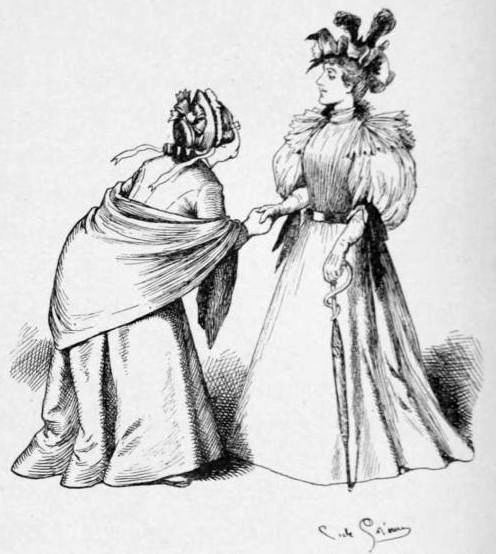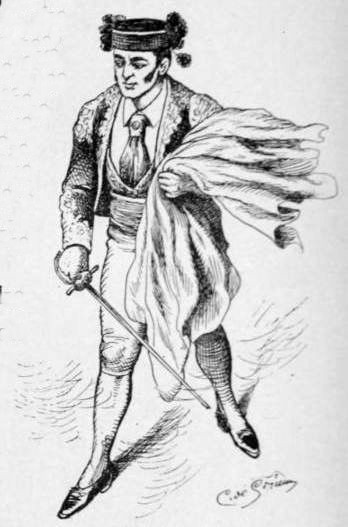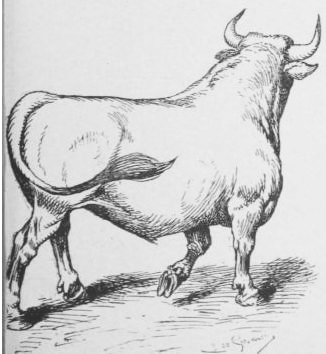CHAPTER XXXV.
THE QUEEN, ULALEY, AND A BULL-FIGHT.
Wall, we had a very fatiguin’ journey, durin’ which I will pass over the sufferin’s of my pardner from the hot, dry climate, the ever-present pangs of hunger, that wuz always with him, and the fraxiousness, that, alas! always overcomes him at sech tuckerin’ times.
I will draw a curtain of cretonne over the incidents of our tegus, tegus journey, and only draw it back agin, on its hot, dry, brass rings, when we are once more settled down in a middlin’ good tarvern at Madrid—I a-settin’ by the winder and Josiah a-layin’ on the bed fast asleep, the dressin’-gown folded lovin’ly round his small-boneded figger.
Martin and the children and Al Faizi went out a good deal to see all the strange, new sights of the Spanish capitol.
But I took considerable comfort a-settin’ still in as comfortable a chair as I could find, a-lookin’ down on the Spaniards and their kinder queer-lookin’ housen, and the strange costooms and ways of another country—
The tall, hauty-lookin’ Dons a-walkin’ along as if the ground wuzn’t quite good enough for ’em to walk on, and the dark-eyed wimmen, and the children, and the beggars, and the splendid carriages, some on ’em drawed by six horses apiece, and their harnesses all glitterin’ with gold, and the humbler vehicles drawed by mules, and these mules trimmed off beautiful, too, and, etc., etc., etc.
Wall, it wuz on the third day after we arrov in Madrid, and I wuz a-walkin’ in the Public Garden with little Adrian and my Josiah, when, on turnin’ the corner of a leafy avenue, who should I see, right face to face a-comin’ towards me, but my intimate friend, Ulaley.
I wuz tickled most to death. It is always happifyin’ in a strange and foreign country to meet anybody you’re intimate with, and when that friend is a Infanty, and one you’ve advised and neighbored with, your happiness is still greater.

SHE KNOWED ME TO ONCE—A HAPPY SMILE CURVED HER PRETTY LIPS.
I advanced and held out my hand, my Josiah and Adrian a-bringin’ up my rear. She knowed me to once—a happy smile curved her pretty lips, and sez she—
“Madam, I’m pleased to meet you. I remember seein’ you in your own country.”
“Yes,” sez I, “we met in Chicago, Ill., and had a first-rate visit there.” Sez I, “How have you been ever sence I see you, and how is all your folks? How is Antonio?” Sez I, “Did he git through the winter all right? Sickness and the grip has been round lots, and if it has spared our two pardners we ort to be thankful. And that makes me think,” sez I, “let me introduce my pardner, Josiah Allen.
“Josiah,” sez I, “this is the Infanty—Ulaley, you’ve hearn me speak on.”
Josiah made his best and lowest bow, and murmured sunthin’ about havin’ read about her in the World.
“Yes,” sez I, “and you’ve hearn me talk about her a sight.”
But he had a sort of a obstinate streak come over him, sech as pardners will have in the strangest and most onconvenient times, and he never assented to that at all, but sed agin that he had read about her in the World.
And I had to let it go. Truly, pardners, though agreeable at times, yet how clost do they clip off the wings of your pride and ambition at other and more various times!
Ulaley see it. Wimmen know only too well how often sech contrarytemps occurs, and she helped me out, as I’ve helped many a woman out of the mud-puddle of embarrassment a pardner’s words have throwed her into.
Sez she, “I have such warm recollections of your country—it is so great a country,” sez she.
“Yes,” sez I, “our country is a middlin’ big one, but I thought I wouldn’t speak of the size on’t to you, Ulaley, thinkin’ that you might think mebby that I’d come over here to kinder twit you of the smallness of yourn.” And wantin’ to be real polite, sez I—
“The value of anything don’t always depend on its size.”
“No, indeed!” sez Josiah.
He wuz alludin’ to his own small weight by the steelyards. But I waved off his speech—I felt quite cool towards him, about as cool as rain-water, and I wouldn’t fall in with his hint and gin him my usual compliment.
Wall, jest as the Infanty and I wuz a-talkin’ back and forth, a woman and a little boy, who had been a-lingerin’ a little behind, come up, and I see in a minute who they wuz; and though I’m bashful by nater—very, yet knowin’ that I had the honor and politeness of my own country and Jonesville to uphold, I advanced towards her in a very admirin’, respectful way.
Yes, I see it wuz the Queen Regent and little Alfonso himself. I wuz tickled, and still hampered, by the duties that devolved onto me, but above all of my emotions riz the thought of how glad I wuz to meet ’em, and how glad they would be afterwards a-thinkin’ it over to think that they had a chance to meet me.
Ulaley didn’t make no move to introduce us. And I see in a minute how it wuz. There wuz the Queen pardnerless and alone, there wuz I with my livin’ pardner; it would roust up too many sad memories to bring us all closter to each other.
But she’d no need to hesitated on that account; I could have told the Queen that though a pardnerless state had its trials, havin’ a pardner brings afflictions also—Heaven knows it duz!
But I see how it wuz, and havin’ the sole glory of Jonesville and America in my eyes, I advanced forwards with quite a lot of dignity and made a deep curchy.
I took holt of each side of my brown alpaca dress and held out the skirt a very little. They wuz good curchys, and I made about three on ’em—two to the Queen Regent and one to Alfonso. I thought one wuz about right for him, considerin’ his age.
I then advanced and held out my hand, and sez I—“I am glad to meet you, Julia, and tell you how well I think on you.” Sez I, “A young woman who has done as well as you have with what you have had to do with deserves to be encouraged, and I’m glad to encourage you.”
She looked awful surprised at my good manners and politeness; she bowed her head in almost dumbfounder, as I could see, and I went on—
“You’ve had a hard time on’t, Julia—real hard. It’s always hard to leave your own folks when you’re married and go and live with his folks, and I presoom you’ve had days when you thought his folks didn’t treat you well—it is nateral. And I presoom he cut up more or less—pardners will. And you, fur away from your own folks, made the cuttin’ up and actin’ seem worse. I persoom you’ve had days when you would have willin’ly swapped off five or six Spanish palaces for one free, onfettered hour beyend the Alps. And you would have willin’ly swapped the most flatterin’ words addressed to you in a strange tongue to listen to the swashin’ waves of the blue Danube, the ripplin’ waves that beat up agin the shores of home—you had a real hard time.
“And then, to cap all, your pardner wuz took from you, before even the catnip wuz put to steepin’—before his baby’s eyes could look any comfort into yours. Poor creeter! what a hard time on’t you did have.
“But when the baby wuz born, he brung a new life to you—you see your dead-and-gone pardner’s first tender love a-shinin’ through the little face, all the passion and dross and dissapintment of a pardner’s love filtered through the divine and satisfyin’ sweetness of a child’s love.
“Oh, he has made life and Spain different things to you, and you’ve sprunted up and done well—you’ve done first rate! You are a-bringin’ up little Alfonso jest as well as I could, and I d’no but better, for, bein’ younger, you can git round spryer and find out new things to teach him. His little hands, too, have drawed you and Spain nigher to each other; you think as much agin of each other as you ust to, and I’m glad on’t.
“And how do you do?” sez I, a-holdin’ out my hand to little Alfonso.
Sez I, “Are you pretty well, Bub?”
He answered real pretty, and I then and there introduced little Adrian to him, and I sez—
“I wish I had both of you children to Jonesville for a month in strawberry time or blackberry time—it would do you both lots of good.” And I sez to his ma—
“It seems to me he looks ruther pimpin’; have you gin him any smartweed lately?” Sez I, “A syrup of smartweed and catnip, half and half, sweetened with honey, would set him right up agin, and if you’d like to try it, I will write and have Philury send you over a bundle of the herbs.”
She hesitated—I see she felt a delicacy about makin’ me so much trouble.
But I sez, “It won’t be no trouble at all—we’ve got more’n a floursack full up in the woodhouse chamber.”
She didn’t reply, but still looked sort o’ wonderin’ and queer.
And I sez—“I will write to-day to Philury to send you a paper bag full of the herbs, and a handful of spignut—that is dretful good for a cold, if he happens to git one, and boys will, goin’ barefooted and actin’.” Sez I, “Pour bilein’ water on ’em, and let ’em stand, and be sure the water biles.”
But at this minute their carriage driv up—they’d been a-walkin’ for exercise, I guess. And though I presoom they hated to leave me—hated to like dogs, they had to tear themselves away.
But they bowed real polite to me, and Ulaley held out her hand and shook hands. The Queen wuz busy with the little boy, but they both bowed real polite after they got into the carriage. And then they driv off.
The carriage wuzn’t nigh so showy as some we see, and the Queen Regent wuz dressed real plain.
I believe she’s a real likely woman, and if anything happens to her, and she should lose her property, I’d love to have her come and settle down in Jonesville—I’d love to neighbor with her first rate.
But I truly hope she won’t never have to make the move—I hope the little King will have his Pa’s good nater, and his Ma’s good sense and Christian sperit, and that Spain and he won’t have no fallin’ out, but do well by each other.
Wall, Martin and Alice went to a bull-fight. I waved off coldly Martin’s request to accompany and go with ’em, though Josiah wuz, for a minute, rampant to go.
But I didn’t encourage him in it.
He sez it would be sunthin’ to talk over with Ury and Deacon Bobbett when I got home.
This wuz his best argument, and I sez, “If I couldn’t talk over anything but this I wouldn’t talk at all. The idee,” sez I, “of human bein’s with hearts in their bosoms a-settin’ to see a wild animal kill a human bein’, and visey versey.” Sez I, “If I should see it goin’ on I should be so shamed on’t that I shouldn’t want to speak agin at all for some time.”
But sez Josiah, “It’s a national recreation; it’s fascinatin’; probble you’d like it.”
“Mebby,” sez I; “mebby my heart would git so hard that I could enjoy it—I, that in days of pig and beef killin’ have always run into the parlor bedroom and put my fingers in my ears to escape the sounds of agony the poor brutes make.” Sez I, “Spozen if in them days I should invite the minister and his folks and the Jonesvillians, and have high seats built up aginst the side of the barn, and let ’em witness the gory spectacle?”

THE MATADOR.
Josiah sot a minute in deep thought. “Wall,” sez he, “I’ll be hanged if it wouldn’t be stylish. You could drape some turkey-red calico over the top, kinder canopy style, and I and Ury could dress like them Spanish Matadors with knee-breeches and a long sash, and some feathers in our hats.”
Sez he, growin’ enthused with the new idee, “We could use our winter scarfs—they’re very gay colored; and I could take that long feather out of your winter bunnet, and have it hang down gracefully over my left shoulder, and I guess Tirzah Ann would lend me a couple to stand up in front. I declare, it would be sunthin’ new and uneek, and we’ll have it next fall.”
I glared at him with a stuny look, and sez I—“And while you’re all dressed up and enjoyin’ yourself, what of the poor dumb brutes who are made to suffer the agony of death?” Sez I, “What happiness could come to you built up on a custom of pain and sufferin’, bloodshed and terrer? Let me hear no more about sech a seen.”
“But,” sez he, “it would make talk; it would be the topic in all the genteel circles of Jonesville and Loontown.”
“If you should brain me with a tommyhawk it would make talk,” sez I.

HIS VICTIM.
“The idee of your follerin’ sech a custom as this. I scorn and despise sech doin’s, and I don’t see what a nation can be thinkin’ on to allow it to go on.”
Al Faizi writ down quite a lot in that book of hisen about the bull-fightin’, and he seemed to be lookin’ for a peticular page to jot down his notes.
And Josiah sez (he hain’t no scruples about questionin’ the noble heathen), sez he, “What are you lookin’ for, Fazer?”
He sez calmly, “I am looking for the page where I wrote down the doings of John Sullivan and other American prize-fighters. I wish to put public exhibitions of this nature together.”
His tone wuz as calm and serene as a cool afternoon in June. He hadn’t a shade of sarcasm or irony in his axent; no, he simply grouped similar occurrences together.
And where wuz my feathers that had stood up hautily on my foretop as I condemned another country’s doin’s and cuttin’s up? Where wuz they? They wuz droopin’ and hangin’ down limp on my foretop as I sot and meditated how we in America allowed prize-fighters to knock and bruise and maim each other in public for the delight of the throngin’ multitude. Then fill hull sides of our American newspapers with minute details of their punchin’ and knockin’ down and actin’, for the eyes of our youth to peruse and emulate. Deeds of religion and science and philanthropy all pushed into the background, amongst the advertisements, while the papers were flooded with the deeds of men fighters and men killers.
The idee! What wuz I, to talk about the doin’s of Spain or the doin’s of a Josiah, and look down on ’em? Truly, folks who live in glass housen mustn’t throw stuns; how many, many times I realized this deep truth when I witnessed doin’s I didn’t like in foreign countries!






